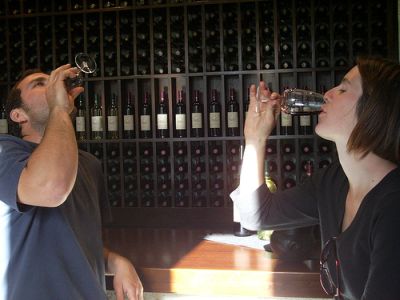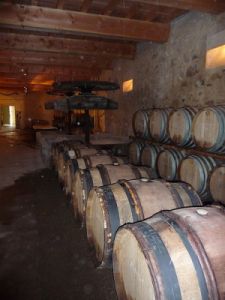
Before you go wine tasting you may want to learn a little about French wine. Here are a couple of posts that should help.
Some small vineyards may only accept visitors based on reservations. Calling several days in advance is a good idea. Larger vineyards and their cellars are open for the public and have standard opening hours.
It’s standard at the larger establishments to pay a small tasting fee, which usually includes a tour or some other activity. Most smaller ones won’t charge anything, but they do expect you to buy a bottle of wine.

Although France has raised the legal drinking age from 16 to 18, this new law does not affect wine tasting. In France, as soon as a kid can hold a wine glass without breaking it they are usually drinking small amounts of wine at home with the family—so don’t be surprised when you go wine tasting and they pull out a glass for your kid.
When tasting, hold the glass by the stem, as you don’t want your body heat to influence the wine’s properties.
There is no need to drink the wine to fully appreciate it. It’s customary to save the drink for the last sample, as it’s always from the winery’s best wine. If you are visiting a “true” cellar you can spit on the floor; otherwise you’ll find a bucket called un crachoir for you to spit into. Personally, I think it’s the ultimate shame to spit out wine, but if you are stopping at many vineyards and don’t want to be hammered – or if you’re the designated driver – I suppose this is a good idea.
Wine certainly isn’t a cheap hobby and these vacations are geared towards the luxury end of the market. Generally speaking, a one-week tour of the wine regions usually costs at least €1000 per person; but packages usually include accommodation, meals, day trips and wine tasting activities.
If you are on a budget, you can always visit the vineyards and cellars on your own and pay a small fee to taste the wines. Also, there are some travel agencies which offer walking guided tours. You are given a booklet with all the instructions and you can enjoy the tour at your own pace. Prices are available on the agencies’ websites (generally on request).
There is no season that is best for wine tasting in France, as it is definitely a year-round activity. That being said, there are festivals and events that make certain times of the year a particularly good time to head out to the vineyards.
September marks the beginning of harvest season, and there are many festivals celebrating the harvest that are centered around wine. However, whether it be July or March, there will always be plenty of wine to taste in France.
If you are on a budget, it is easiest to get cheap airfare to France and better deals on hotels in France in the off season travel months (October-May).
And if you’re looking for a theme for your wine tasting vacation, why not concentrate on the female winemakers in the Languedoc region? Check out this video for more information:
Photo Attributions: Top photo from germeister’s flickr, photo of caves thanks to Chez Loulou